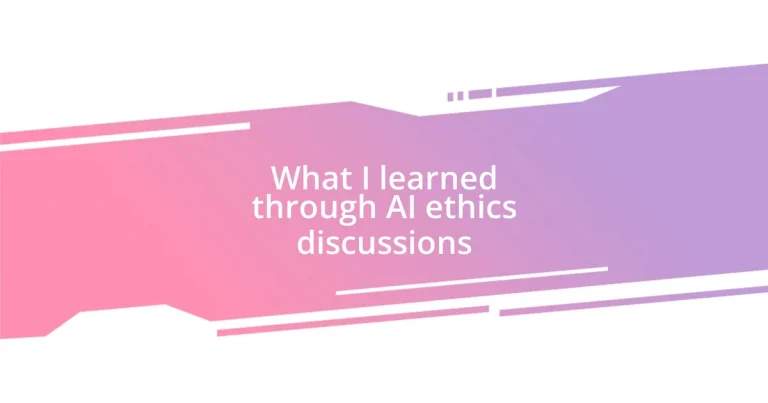Key takeaways:
- The importance of AI ethics lies in preventing biases, reinforcing human rights, and building user trust through transparency and open dialogue.
- Key ethical principles include fairness, accountability, privacy, human-centric design, and safety, which guide responsible AI development and foster workplace equity.
- Future trends in AI ethics emphasize integrating ethical design from the beginning, increasing public engagement in AI governance, and establishing accountability and regulation to create a more trustworthy tech landscape.
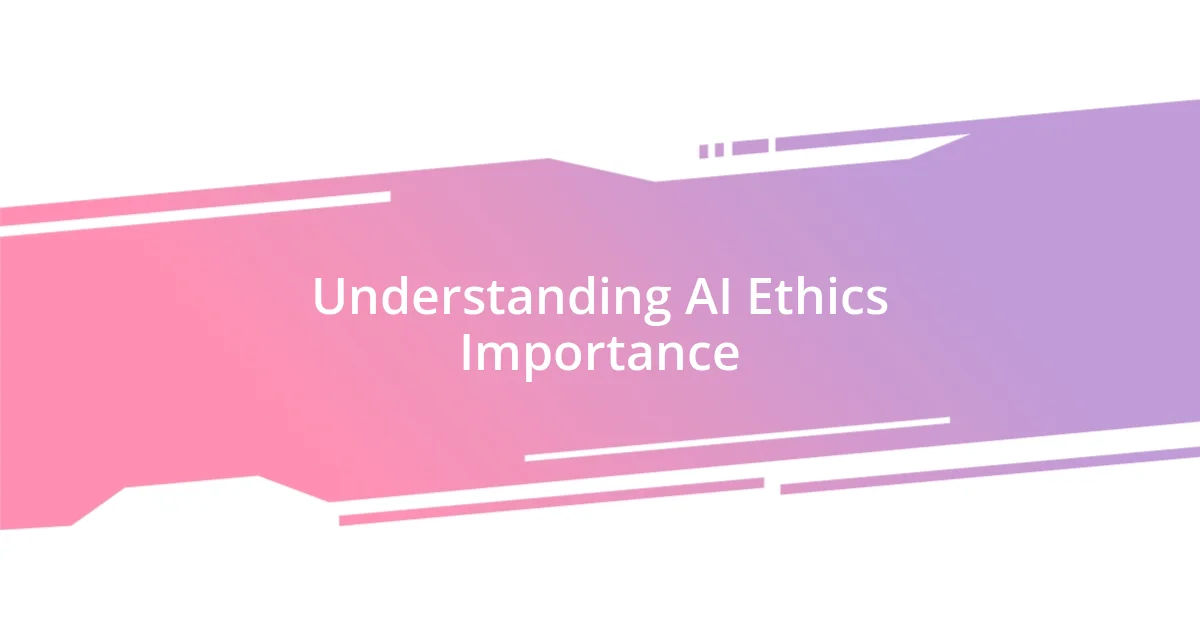
Understanding AI Ethics Importance
AI ethics is vital because it shapes how technology impacts our lives. When I first dove into discussions about AI ethics, I was struck by how various algorithms can reinforce biases—suddenly, it became clear that unchecked AI could perpetuate societal injustices. Have you ever considered how your personal data might be used in ways that you never intended?
The complexity of AI systems often leaves users feeling powerless, which is why understanding AI ethics is crucial. I vividly remember a moment during a seminar where we dissected the implications of facial recognition technology. Watching my peers react with shock to its potential misuse made me realize how essential it is to establish guidelines that prioritize human rights over technological advancements.
Moreover, navigating AI ethics helps build trust between developers and users. I can recall a conversation with a friend who hesitated to engage with AI tools, fearing loss of privacy. That discussion highlighted something profound: when we prioritize ethical considerations, we not only address concerns but also foster acceptance and innovation within society. How can we encourage more open dialogues about AI’s ethical implications to ensure everyone feels safe using these technologies?
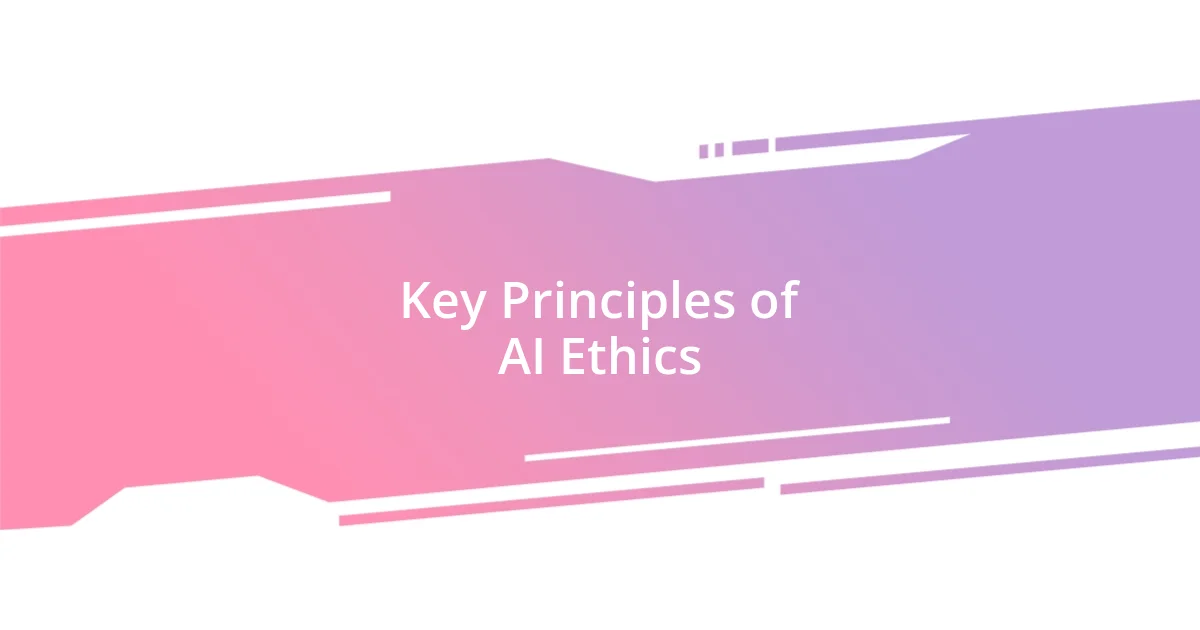
Key Principles of AI Ethics
When I reflect on the key principles of AI ethics, a few stand out as non-negotiable for guiding responsible AI development. Transparency, for instance, is essential; I remember a tech hackathon where our team focused on making our AI model explainable. We wanted users to understand why the system made specific recommendations, and seeing their faces light up with comprehension was incredibly rewarding. It reinforced how clarity about algorithms builds trust.
Here are some other key principles that I believe are foundational to AI ethics:
- Fairness: Ensuring AI systems avoid bias and treat all individuals equitably.
- Accountability: Establishing clear ownership and responsibility for the actions of AI systems.
- Privacy: Respecting user data and ensuring robust protections against misuse.
- Human-Centric Design: Keeping the focus on enhancing human welfare and dignity.
- Safety: Designing AI systems to minimize harm while maximizing benefits.
These principles aren’t just theoretical; they have personal relevance. During a recent workshop, I saw the impact of implementing these standards as we assessed the ethical footprints of various AI solutions. Hearing my peers share stories of how fairness in AI had changed their workplace dynamics reminded me how essential these discussions are for everyone involved.
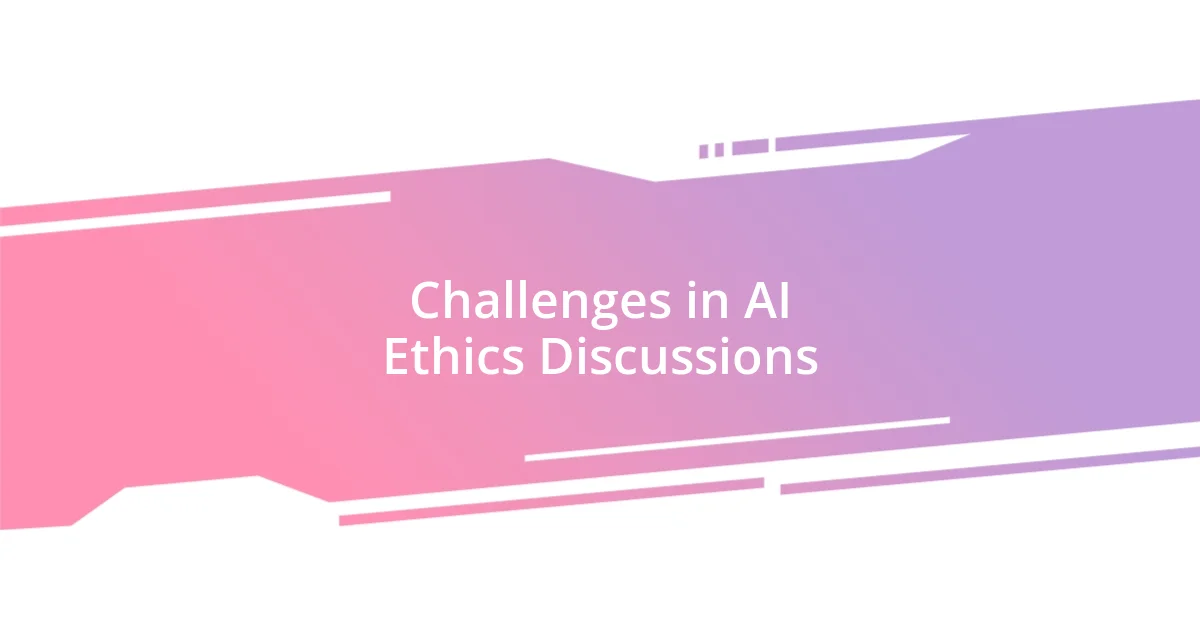
Challenges in AI Ethics Discussions
Challenges in AI ethics discussions are significant and multifaceted. One challenge I’ve encountered is the divergence in perspectives among participants. For instance, during a recent ethics roundtable, I found myself grappling with opposing views on AI surveillance. While some emphasized security benefits, others raised concerns about privacy invasion. This clash of opinions not only highlighted the complexity of ethical considerations but also reinforced the necessity for inclusive dialogue.
Additionally, the rapid pace of AI advancement presents a unique obstacle in ethics discussions. I recall an incident during a panel discussion where we debated the implications of autonomous vehicles. Just as we began to reach a consensus, a new study emerged suggesting unforeseen risks. This experience made it clear how critical it is to stay informed and adaptable, even as conversations evolve.
Finally, the lack of representative voices in these discussions can diminish their depth and effectiveness. Our group once discussed the implications of AI in healthcare, but many marginalized communities weren’t represented. I couldn’t shake the feeling that their insights were missing. This underscored the importance of diverse perspectives in AI ethics to address systemic inequalities and foster responsible development.
| Challenges | Implications |
|---|---|
| Divergence in Perspectives | Hinders consensus and deepens ethical dilemmas. |
| Rapid Pace of AI Advancement | Creates difficulty in establishing stable ethical frameworks. |
| Lack of Representative Voices | Leads to incomplete discussions and overlooked inequalities. |
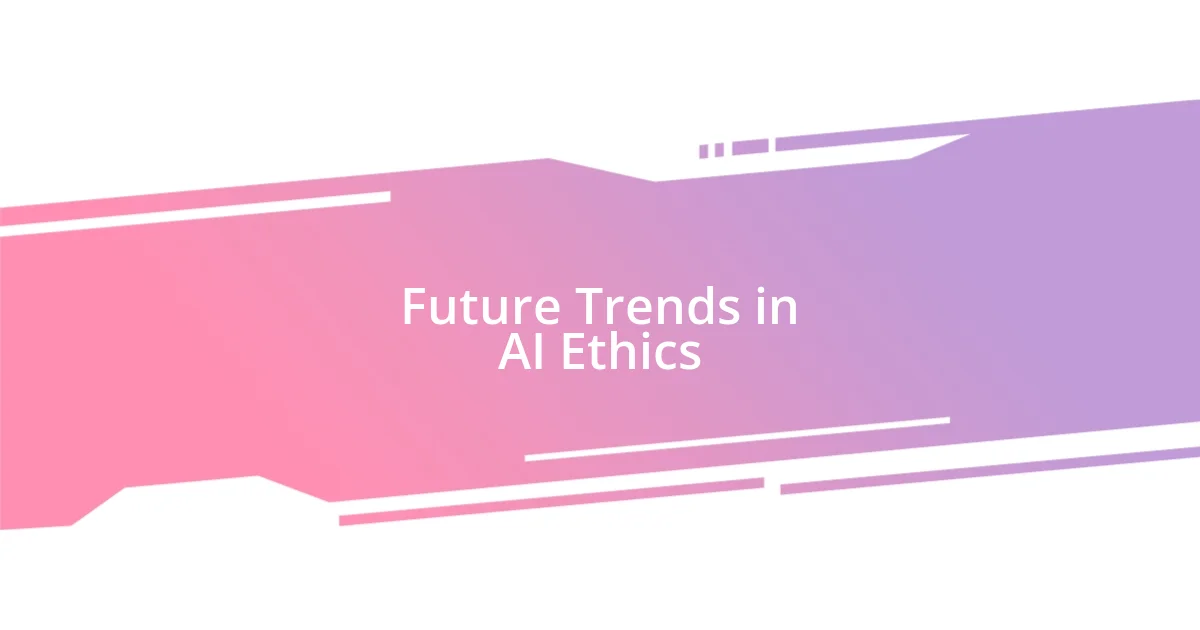
Future Trends in AI Ethics
As I look ahead, one trend that captures my attention is the increasing emphasis on ethical AI design principles integrated right from the start. I recall a recent brainstorming session where we debated incorporating ethical considerations into every stage of AI development. It became evident that this proactive approach would not only mitigate risks but also foster a culture of responsibility among developers. Have you ever imagined what it might be like if every piece of software we interacted with had built-in ethical checks? The thought excites me, as it could lead to a future where tech truly serves humanity’s best interests.
Another noteworthy trend on the horizon is the growing call for public engagement and democratic oversight in AI governance. I remember attending a community workshop where locals voiced their concerns about AI’s impact on jobs. Their passion highlighted a crucial point: the need for transparency and inclusion in AI-related decisions. It made me wonder, how can we involve everyday people in shaping the future of technology? By fostering open discussions and inviting diverse voices, we can ensure that AI development reflects the values and needs of the communities it affects.
Finally, accountability and regulation seem poised to take center stage. I couldn’t help but feel a sense of urgency during a recent conference when experts discussed creating universal standards for AI ethics. The idea that we could have a global framework to hold developers accountable is compelling. It leads me to ponder: what if every AI system had to undergo rigorous ethical assessments before being deployed? Such measures could lead us toward a more trustworthy technological landscape, where the emphasis shifts from merely advancing innovation to upholding ethical standards.












